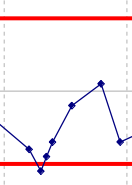Everyone’s specific experience differs in details due to multiple individual variables so no one necessarily experiences the exact same sequence or time frames. Generally speaking, however, after starting keto, blood ketone concentration tends to rise for a while. This is due to synthesis of ketones by the liver being out of synch with utilization of ketones by cells and organs. Because new energy pathways must be established, cells and organs do not use ketones or fatty acids efficiently at first. Thus, a lot of ketones being synthesized by the liver, acetoacetate, ends up just floating around in the blood stream doing nothing much. Some of the unused acetoacetate converts to β-hydroxybutyrate, which is its more stable ‘storage’ form, and some disintegrates into acetone and CO2. The β-hydroxybutyrate is what you measure with your blood tests.
What is called ‘fat adaptation’ refers to cells and organs learning how to use ketones/fat more efficiently. Thus over a period of weeks and months the synthesis of ketones by the liver becomes more in synch with their utilization by cells and organs. In addition, as cells and organs learn to utilize fatty acids their need for ketones decreases. So overall, blood ketone concentration tends to decrease since whatever acetoacetate being synthesized by the liver is being utilized immediately or very quickly and not stored as β-hydroxybutyrate.
But different strokes for different folks applies here. Some people never measure very high ketone concentrations, some do even well after being fat adapted. Some fluctuate up and down. There are so many variables involved you can find someone somewhere who exhibits every possibility.
Insulin plays a significant role here, of course. As insulin resistance decreases, one moves towards a healthy state of lowered glucose and insulin concentrations in the blood. It doesn’t necessarily translate to higher ketones, although for some it does. At least for a while.

